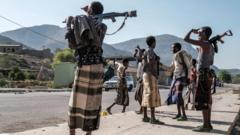Ethiopia's main opposition party, the Tigray People's Liberation Front (TPLF), has expressed grave concerns over a recent ban on its political activities, claiming it poses a "serious threat" to the peace deal reached in 2022 that concluded a protracted conflict in the Tigray region. The National Election Board of Ethiopia revoked the party's legal status citing a failure to conduct a general assembly, a decision that has fueled tensions amid ongoing political instability.
The TPLF, which plays a pivotal role in Tigray's interim administration established in 2023, has called for intervention from the African Union, emphasizing that the ban undermines the principles laid out in the Pretoria peace agreement. According to TPLF Deputy Chairman Ammanuel Assefa, this deregistration could critically damage the fragile peace process, which has already faced delays in its implementation, notably the return of nearly one million displaced individuals from the earlier conflict.
The TPLF led a coalition that removed the previous Ethiopian government in 1991 but found itself ousted in 2019, leading to a civil war that resulted in extensive human suffering and dislocation. Tensions have remained high since the truce signed in November 2022, with fears escalating that this latest ban could reignite violence in the region. Several international observers, including leaders from the US, UK, and the European Union, have urged all parties to avoid any resurgence of conflict, highlighting the need for dialogue and the resolution of political issues.
As the country heads toward nationwide elections, originally scheduled for June 2024, the path to a secure and stable political environment in Ethiopia remains fraught with challenges.



















